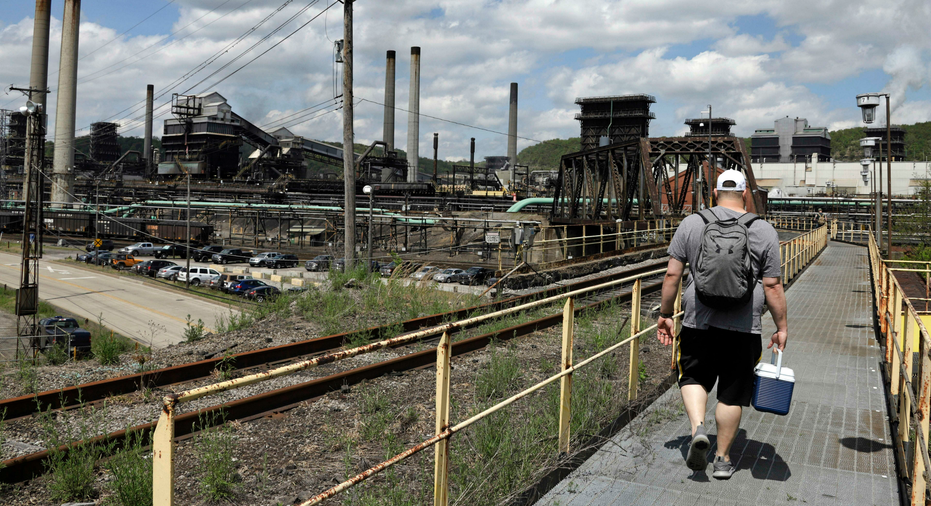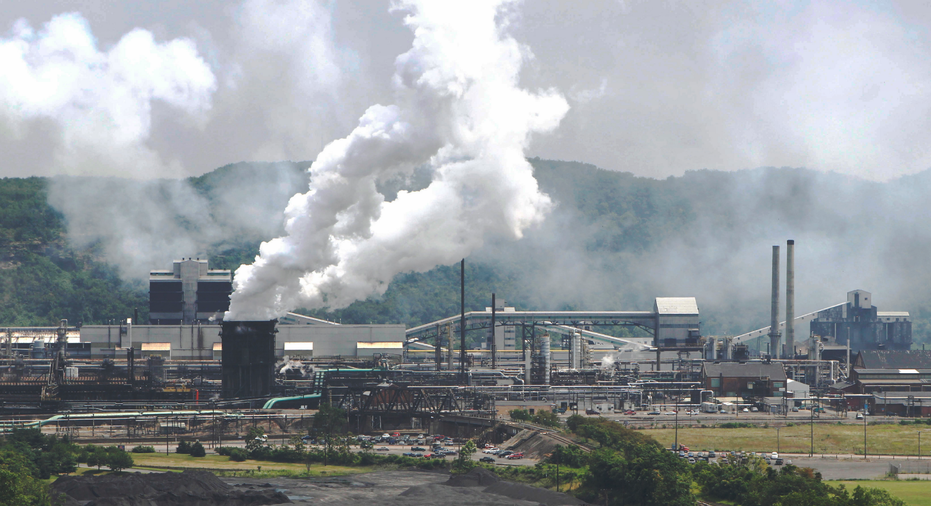Correction: Steel Plant-Pollution story
FILE - In this May 2, 2019, file photo a worker arrives for his shift at the U.S. Steel Clairton Coke Works in Clairton, Pa. A fire at U.S. Steel's massive coke plant outside Pittsburgh knocked a key pollution control system offline Monday, June 17, 2019. It triggered a health warning as officials monitored the air around the plant for signs of a release of toxic sulfur dioxide. It was the second fire since December at the coke works, the largest facility of its kind in the United States. The plant turns coal into coke, one of the raw materials of steel. (AP Photo/Gene J. Puskar, FILE)
In a story June 17 about a fire at U.S. Steel's Pennsylvania coke plant, The Associated Press reported erroneously the impact of the mishap on the neighborhood's air quality. The company said air monitoring equipment indicated that sulfur dioxide levels did not exceed emissions limits around the plant through Monday afternoon.
A corrected version of the story is below:
Fire triggers pollution concerns at US Steel coke plant
The second fire in six months at U.S. Steel's massive coke plant outside Pittsburgh knocked a key pollution control system offline for nearly 16 hours
By MICHAEL RUBINKAM
Associated Press
The second fire in six months at U.S. Steel's massive coke plant outside Pittsburgh knocked a key pollution control system offline for nearly 16 hours Monday, prompting a health warning for residents and stern words from the region's top elected official.
The steelmaker announced late Monday that it had completed repairs following a small electrical fire, and equipment that removes toxic sulfur dioxide from coke oven gases was back in operation. Air monitoring equipment indicated that sulfur dioxide levels did not exceed emissions limits around the plant through Monday afternoon, according to U.S. Steel.
"Restarting the desulfurization facility and minimizing the potential for impacts to the environment and community were of the highest priority for the company," said U.S. Steel spokeswoman Meghan Cox.
The Allegheny County Health Department had threatened to shut down the plant unless U.S. Steel acted quickly to fix its damaged equipment, while elected officials and environmental groups, mindful of the company's troubled recent history at the Clairton coke works, chastised the Pittsburgh-based steelmaker even as the latest incident turned out to be minor.
A Christmas Eve fire in the same area of the plant caused $40 million in damage and significant releases of sulfur dioxide, a pungent byproduct of fossil fuel combustion that can make it hard to breathe.
"I'm very disappointed that this is happening again. People in this community need assurance that the pollution control equipment is reliable and usable," County Executive Rich Fitzgerald said in a statement issued three hours before U.S. Steel announced it had resumed normal operations.
Health officials have levied more than $2 million in fines against U.S. Steel since June 2018 over persistent emissions problems at the coke works, the largest facility of its kind in the United States. The plant in Clairton turns coal into coke, a raw ingredient in the steelmaking process.
While the Dec. 24 fire triggered significant releases of sulfur dioxide, health officials said Monday that monitoring equipment had not detected a similar spike from latest blaze. Nevertheless, the elderly, parents of children and people with respiratory conditions "should be aware of the potential for elevated levels of (sulfur dioxide)," the health department had said in a statement.
Environmental groups lambasted U.S. Steel for its repeated lapses at the Clairton coke works, pointing to a May 17 incident in which the company reported a large release of 525,000 pounds (238,138 kilograms) of coke oven gas from a pressure release valve. The Breathe Project, an environmental group, said it discovered the release through a search of the U.S. Coast Guard's National Response Center database of discharges of oil, chemicals and other substances.
"There is clear evidence that the problems at this plant have not been resolved and this plant cannot operate under control," said Matt Mehalik, executive director of the Breathe Project.
In the latest incident, U.S. Steel said a small fire in an electrical panel around 4:30 a.m. Monday caused three control rooms to lose power. Though power was restored in one control room, the others, which control the desulfurization equipment, remained without electricity throughout the day.
U.S. Steel is continuing to deal with significant regulatory and legal fallout from the Dec. 24 fire at Clairton.
Two Pennsylvania environmental groups, PennEnvironment and the Clean Air Council, have filed a federal lawsuit that alleges U.S. Steel violated the Clean Air Act by operating the plant without its desulfurization unit for more than three months. In a separate lawsuit, a woman alleges she suffered headaches, a persistent cough, throat irritation and difficulty breathing. That suit seeks class action status.
"This just adds to a long list of permit violations and air quality issues at the plant," said Matt Walker, community outreach director at the Philadelphia-based Clean Air Council. "Two incidents in that short amount of time should raise serious concern from regulators, elected officials and residents."
U.S. Steel's Clairton facility produces about 4.3 million tons of coke annually to serve its own steelmaking operations and the larger commercial coke market.





















